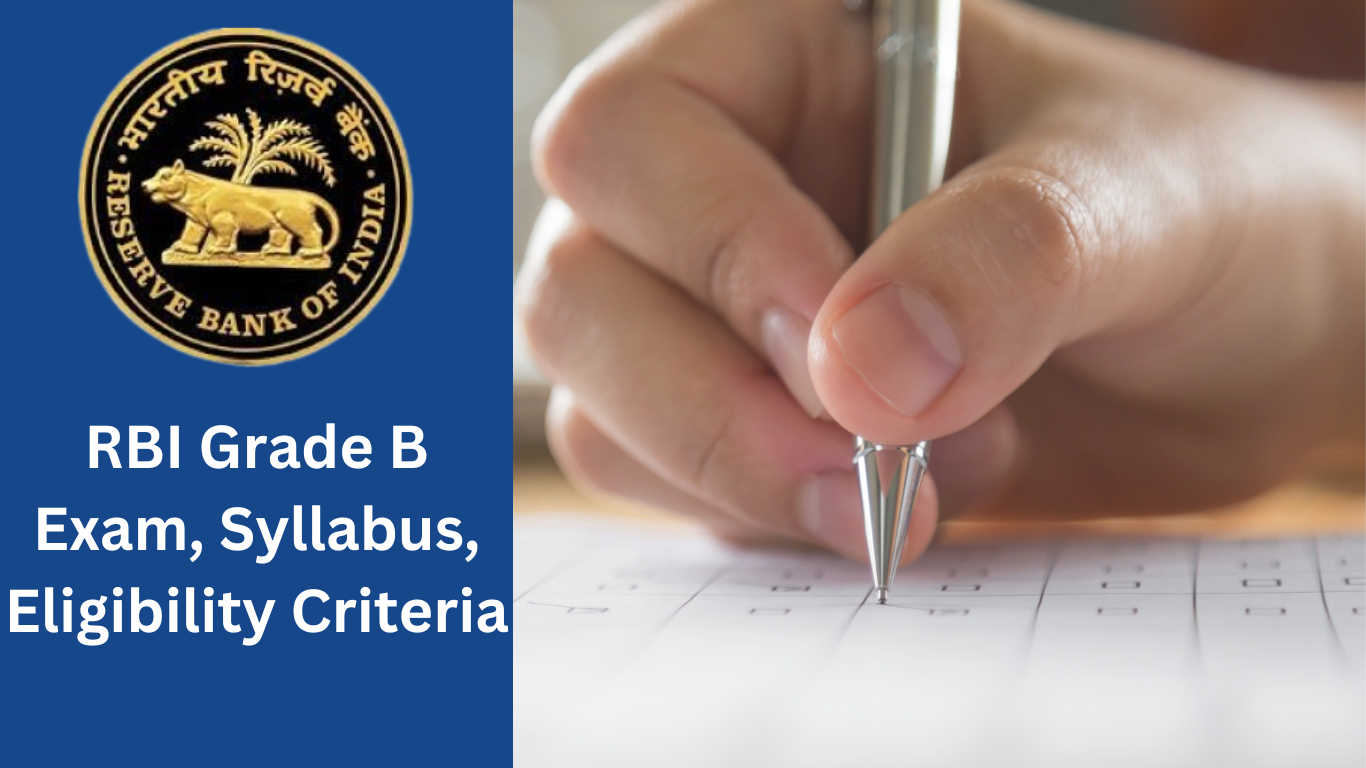Comprehensive Guide to RBI Grade B Examination: Structure, Syllabus, and Preparation Tips
Jhon Wik . Follow
4 months ago

The Reserve Bank of India (RBI) Grade B examination is one of the most sought-after exams for those aspiring to join the banking sector. The RBI, being the central bank of India, offers a prestigious and challenging career through this examination. This guide provides a comprehensive overview of the RBI Grade B exam, covering its structure, syllabus, and effective preparation tips to help you succeed.
Examination Structure
The RBI Grade B examination is conducted in three phases: Phase I (Preliminary), Phase II (Main), and the Interview round.
Phase I: Preliminary Exam
The preliminary exam is an objective-type test and serves as a screening round. It comprises four sections:
General Awareness: This section tests your knowledge of current events, banking and financial awareness, economic news, and general knowledge.
Quantitative Aptitude: This section includes questions on arithmetic, data interpretation, algebra, and basic mathematics.
English Language: This section tests your comprehension, grammar, vocabulary, and other language skills.
Reasoning Ability: This section includes questions on logical reasoning, puzzles, coding-decoding, and analytical reasoning.
The preliminary exam consists of 200 questions, each carrying one mark. The duration of the exam is 120 minutes, and it is crucial to manage your time effectively to attempt all sections.
Phase II: Main Exam
Candidates who qualify for the preliminary exam move on to the main exam, which is both objective and descriptive. Phase II consists of three papers:
Economic and Social Issues (ESI): This paper tests your understanding of the Indian economy, social issues, and development. Topics include inflation, poverty, employment, sustainable development, and social justice.
English (Writing Skills): This paper evaluates your writing abilities. You are required to write essays, précis, and comprehension based on given topics.
Finance and Management (FM): This paper covers topics related to financial markets, banking, corporate governance, risk management, and management principles.
Each paper in the main exam is worth 100 marks, and the duration for each paper is 90 minutes. Effective preparation and a good understanding of these subjects are vital for scoring well in this phase.
Interview Round
Candidates who clear Phase II are called for the interview round. The interview carries 75 marks and is aimed at assessing your personality, communication skills, and suitability for the role of an RBI Grade B officer. Preparing for the interview involves staying updated with current affairs, understanding banking and economic concepts, and honing your soft skills.
Detailed Syllabus
Understanding the RBI Grade B syllabus is crucial for effective preparation. Here's a detailed overview of the topics covered in each phase:
General Awareness (Phase I)
Current Affairs: National and international events, awards, sports, appointments, etc.
Banking and Financial Awareness: RBI functions, monetary policies, banking terms, financial institutions, etc.
Economic News: Budget, economic surveys, policy changes, etc.
Static GK: History, geography, polity, culture, etc.
Quantitative Aptitude (Phase I)
Data Interpretation: Bar graphs, line graphs, pie charts, tables, etc.
Arithmetic: Percentages, ratios, averages, time and work, time and distance, profit and loss, etc.
Algebra: Equations, inequalities, sequences, and series.
Mensuration: Area, volume, surface area of geometrical shapes.
English Language (Phase I)
Reading Comprehension: Passages followed by questions.
Grammar: Error detection, sentence correction, fill in the blanks.
Vocabulary: Synonyms, antonyms, idioms, and phrases.
Verbal Ability: Para jumbles, sentence rearrangement.
Reasoning Ability (Phase I)
Logical Reasoning: Syllogisms, analogies, cause and effect, etc.
Analytical Reasoning: Puzzles, seating arrangements, blood relations, direction sense.
Non-Verbal Reasoning: Series, patterns, odd one out.
Coding-Decoding, Input-Output.
Economic and Social Issues (Phase II)
Growth and Development: Measurement of growth, national income, poverty alleviation.
Economic Reforms: Industrial policy, monetary and fiscal policy, privatization, globalization.
Social Issues: Education, health, gender issues, social justice.
International Economic Issues: IMF, World Bank, WTO.
English (Writing Skills) (Phase II)
Essay Writing: Topics on current events, economy, social issues.
Précis Writing: Summarizing given passages.
Comprehension: Understanding and interpreting given texts.
Finance and Management (Phase II)
Financial Markets: Money market, capital market, instruments, and institutions.
Banking: Functions, types, risk management, NPAs.
Management: Principles, HR development, corporate governance, ethics.
Corporate Governance: Policies, transparency, accountability.
Preparation Tips
To excel in the RBI Grade B examination, a well-structured preparation strategy is essential. Here are some effective tips to guide your preparation:
Understand the Exam Pattern and Syllabus
Start by thoroughly understanding the exam pattern and syllabus. This will help you prioritize topics and allocate time effectively.
Create a Study Plan
A well-structured study plan is crucial. Allocate specific time slots for each subject and stick to your schedule. Ensure you cover all topics and have enough time for revision.
Read Newspapers and Magazines
Stay updated with current affairs by reading newspapers, magazines, and financial journals. Focus on economic news, banking updates, and social issues. This will help you in both the General Awareness section and the interview round.
Practice Mock Tests
Regular practice of mock tests is vital for success. It helps you get familiar with the exam pattern, manage your time efficiently, and identify your strengths and weaknesses. Analyze your performance in mock tests and work on areas that need improvement.
Focus on Basics
Build a strong foundation by focusing on basic concepts. For Quantitative Aptitude and Reasoning Ability, practice basic arithmetic, algebra, and logical reasoning questions. For the English Language, work on grammar, vocabulary, and comprehension skills.
Refer to Standard Books
Use standard reference books and study materials recommended for RBI Grade B preparation. Some popular books include:
"Indian Economy" by Ramesh Singh
"Economic Survey" and "Union Budget"
"Banking Awareness" by Arihant Publications
"Verbal and Non-Verbal Reasoning" by R.S. Aggarwal
Join Coaching Classes or Online Courses
Consider joining coaching classes or enrolling in online courses for structured guidance. Coaching institutes provide study materials, mock tests, and expert guidance, which can be beneficial for your preparation.
Work on Writing Skills
For the English (Writing Skills) paper in Phase II, practice writing essays, précis, and comprehension regularly. Focus on clarity, coherence, and concise writing. Reading editorials and opinion pieces can also help improve your writing style.
Revise Regularly
Regular revision is crucial to retain information. Set aside time for revision in your study plan and go over important topics, formulas, and concepts frequently.
Stay Healthy and Positive
Maintaining good physical and mental health is essential during preparation. Take regular breaks, eat a balanced diet, exercise, and get adequate sleep. Stay positive and motivated throughout your preparation journey.
Conclusion
The RBI Grade B examination is a challenging but rewarding opportunity for those aspiring to work in the banking sector. With a clear understanding of the exam structure, detailed knowledge of the syllabus, and a well-structured preparation strategy, you can enhance your chances of success. Stay focused, work hard, and keep a positive attitude.



